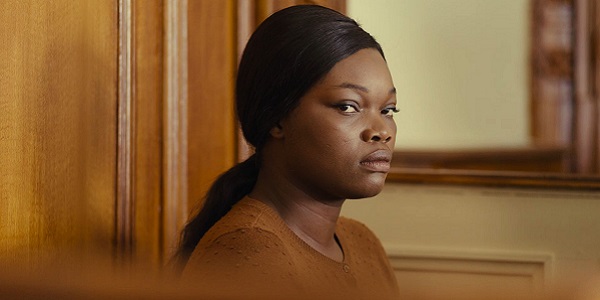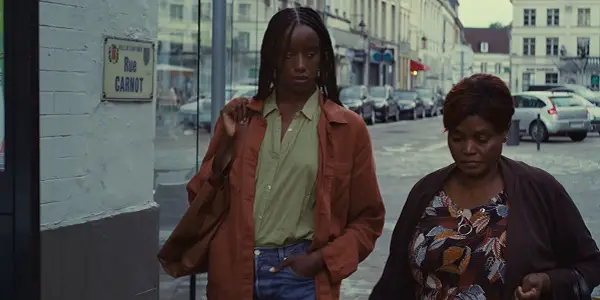SAINT OMER: A Tale of Two Women

Lee Jutton has directed short films starring a killer toaster,…
The narrative feature debut from acclaimed documentary filmmaker Alice Diop, Saint Omer follows a pregnant novelist who attends the trial of a Senegalese immigrant accused of infanticide. Inspired by Diop’s personal experiences attending the trial of Fabienne Kabou, who was convicted of the same crime in 2016, the film explores the myriad complex issues at the heart of the case—race, the immigrant experience, generational trauma, motherhood—with incredible empathy, elevating what may at first appear to be a standard legal drama to something quite extraordinary.
A Modern Medea
Rama (Kayije Kagame) is a professor and novelist who is expecting her first child with her partner, Adrien (Thomas de Pourquery) but is reluctant to share that information with her mother. Instead, she heads from Paris to Saint-Omer to witness the trial of Laurence Coly (Guslagie Malanga), a Senegalese woman accused of leaving her 15-month-old daughter on a beach to be washed away by the rising tide. Laurence does not deny the crime, yet she still pleads not guilty; when asked why she killed her child, she replies, “I don’t know…I’m hoping this trial will give me the answer.”

Yet instead of answers, more and more questions are raised as Laurence tells her story on the stand. It’s a story filled with confusion and conflicting statements, as Laurence describes her childhood in Senegal, her move to Paris to attend university, and her various attempts to survive as an inexperienced young woman in a foreign country. She ends up in a relationship with a white Frenchman, Luc Dumontet (Xavier Maly), more than 30 years her senior and still involved with his estranged wife; whether she was truly in love with Luc or just looking for a patron to provide her with housing and money for her education is a question that recurs as she testifies.

Regardless, what is clear throughout Laurence’s testimony is the intense isolation that has marked her life. From her lonely youth in Senegal with unloving parents who cared more about her academic success than her feelings, to her later dependence on an older man who never introduced her to his family or friends, Laurence has lived the life of a ghost, hovering on the periphery of other people’s lives. It’s no wonder she chose to study philosophy at university; what better way to try and determine her real reason for existing in the world? “I’m not being ambiguous,” she retorts when the prosecutor accuses her of being so during her testimony. “Some things we can’t be sure about.”
Anatomy of a Murder
As Rama continues to observe the case, hoping to use it as inspiration for her next novel, dark memories from her own unhappy upbringing resurface to haunt her and make her question her own ability to raise a child. These feelings are compounded by Rama’s newfound acquaintance with Laurence’s mother, whose presence in court cannot help but remind Rama of her complicated relationship with her own Senegalese immigrant mother.
Like Laurence, Rama exists at the heart of a clash of cultures; she was born in France and is in a relationship with a white Frenchman, but she is also unmistakably of African descent and must deal with the assumptions others make based on that fact. When Rama’s publisher makes a surprised comment regarding Laurence’s sophisticated French, Rama notes with an undercurrent of exasperation that Laurence merely sounds like an educated woman; in that one line, one can hear echoes of all of the similar comments Rama has likely been on the receiving end of over the course of her life and career. This is not the only moment in Saint Omer in which a white character is confused when the eloquent Laurence does not fit their preconceived notions of what an African immigrant—let alone a child killer—should be; one can hardly blame Laurence for seeming to use this to her advantage during her testimony.

Saint Omer is photographed in a suitably matter-of-fact manner by master cinematographer Claire Mathon (Portrait of a Lady on Fire, Spencer), with the camera lingering for long takes on Laurence’s face as she relates her story and listens to what others have to say about her on the witness stand. It’s as though the camera—like Rama, like us—is trying to understand why such an intelligent young woman would do such an incomprehensible thing. The film’s cinematography is not flashy, but that’s what makes it so effective; it contrasts sharply with the emotionally devastating material being relayed in those scenes and yet also emphasizes that devastation. It’s also worth noting that the Black women at the heart of Saint Omer are lit appropriately and photographed beautifully, though that’s not a surprise when one considers Mathon’s previous work on Mati Diop’s gorgeous Atlantics.
The bulk of Saint Omer takes place in the courtroom, as Laurence speaks and Rama watches; the two characters never exchange more than a mere glance, but even that is so charged that it brings Rama to tears. Both actresses so fully embody these characters that one could easily be tricked into thinking Saint Omer was another one of Diop’s documentaries. Malanda has perhaps the showier role, with the bulk of the dialogue, yet her performance as Laurence is most brilliant in its restraint; when she does finally break down on the stand, the audience cannot help but also feel some much-needed emotional release. And Kagame is capable of conveying so much just by watching: not just Laurence, but Laurence’s mother and the others in the courtroom, the vast majority of whom are women, all of whom share the same obsession with Laurence and her crime.
Conclusion
In recreating her own experiences watching Kabou’s trial in Saint Omer, and re-interrogating the complex feelings she felt during that time as an expectant mother and daughter of immigrants, Diop has delivered one of the most powerful and personal films of the year.
Saint Omer will be released in theaters in the U.S. on January 13, 2023 and in the UK on February 3, 2023. You can find more international release dates here.
Watch Saint Omer
Does content like this matter to you?
Become a Member and support film journalism. Unlock access to all of Film Inquiry`s great articles. Join a community of like-minded readers who are passionate about cinema - get access to our private members Network, give back to independent filmmakers, and more.
Lee Jutton has directed short films starring a killer toaster, a killer Christmas tree, and a not-killer leopard. Her writing has appeared in publications such as Film School Rejects, Bitch: A Feminist Response to Pop Culture, Bitch Flicks, TV Fanatic, and Just Press Play. When not watching, making, or writing about films, she can usually be found on Twitter obsessing over soccer, BTS, and her cat.













